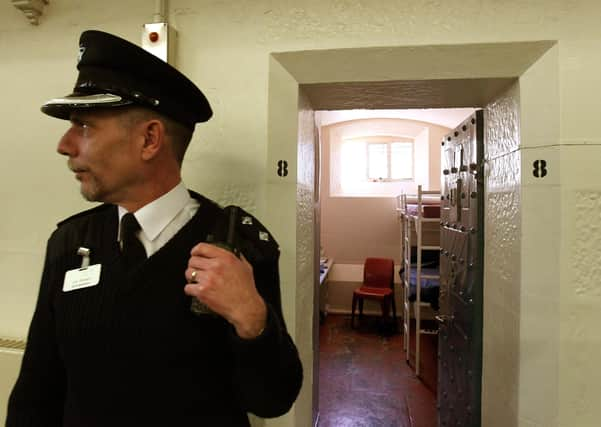Scotland’s prisons are a coronavirus hothouse. Here’s what we must do – Kenny MacAskill


Prisoners and those with a drug addiction often generate little sympathy. ‘They’ve committed the crime so let them do the time,’ it’s said, or ‘it’s self-inflicted harm and why should we care?’ But we should, and we must, as it’s not just a moral argument but an issue that will harm us all unless we act.
It’s the loss of liberty after all that’s the sentence, not hard labour, despite the clamour of a few. Nor is it imposing ill health and harm upon them. That’s rightly decried by us as a civilised society. Moreover, the state, having taken away their freedom, has a duty of care towards them.
Advertisement
Hide AdAdvertisement
Hide AdYet harm is now faced by all those incarcerated. The whole atmosphere of a prison after all is more geared towards hothousing the virus, rather than shielding the prisoner from infection. The closed and confined space, the limited movement and shared facilities are all aspects that accentuate rather than mitigate harm.
On top of that, there’s the added pressure of bulging prison numbers with some doubled or even trebled up, the ability to self-isolate almost non-existent and shielding problematic to say the least. Public perception may be of fit young men, but many are far from that. Prisoners are increasingly ageing, and many have very poor health, in particular bronchial and other respiratory diseases that make them vulnerable to the virus.
If there’s still no sympathy amongst some, then consider the position of prison officers. They can’t work from home and are required to share those same confined spaces. They and their families have rights too. Indeed, the numbers of officers either ill or self-isolating, I’m told, is near 25 per cent in Scotland and similar south of the border. For those working, personal protective equipment (PPE) hasn’t yet appeared and it’s ‘just get on with it as best you can’.
Serious disturbances
But that again compounds the situation. For fewer officers and the restriction of prisoner movement in an already confined space means being locked in your cell alone for 23 hours or even, I’ve heard, 23-and-a-half. Many of us are climbing the wall despite the rooms in our homes and the garden outside. It’s harder for those in tenement flats but even they can move about and, most often, are able to go outside.
In prison, even the limited exercise is constrained, and socialisation is difficult. Phone calls are limited with Skype and other mediums denied. Entertainment isn’t exactly the in-house facilities of even a modest hotel. Isolation and boredom are constant factors at the best of times, and these are the worst of times. Similarly, the separation that many of us now face from friends and families is even more acute for prisoners.
It’s a recipe for disaster in so many ways. Staff and inmates are being monitored and positive cases are rising; deaths from the infection have already occurred. Much, much worse could follow. In addition to all that, incidents of self-harm are rising, and more tragedies will follow. There’s also the danger that serious disturbances, that we’ve seen quite recently in England and in the past in Scotland, will re-occur. That’ll simply fuel every one of those issues.
Drug deaths may rise
We put people in prison to punish them, not kill them or have them take their own lives. It’s for those reasons that a prisoner release scheme is needed. For sure it can’t be for everyone. There are some too dangerous to let out and others where the sentence is too long. But there are many who aren’t and are nearing the end of their sentence or even on remand awaiting trial. It needs looked at on an individual basis and there’s a duty to ensure that they’ve got somewhere to go. But they can be let out on licence and remain at home.
Both governments in Scotland and in London have intimated a willingness to do so. They need to do so fast, but we need to support them in that. It’ll be better for them, for officers and indeed for all of us.
Advertisement
Hide AdAdvertisement
Hide AdA similar plight faces those with an addiction. Accessing the drugs or the support – or both – that they need is complicated, if not curtailed. The same issues that we all face of closed venues, limited supply, or loss of contact are heightened. Again, there’s little sympathy and some welcome steps have been taken by the Scottish Government in financial support.
But it’s not nearly enough and yet we need to be concerned. In recent years, the focus has been on the tragedy of drug deaths. But, if we don’t do something soon, we ain’t seen nothing yet. All the progress made in reducing crime and tackling issues such as HIV will reoccur. If we want Trainspotting to remain a movie and not return to being reality, we need to be bold.
Kenny MacAskill is SNP MP for East Lothian
A message from the Editor:
Thank you for reading this article on our website. While I have your attention, I also have an important request to make of you.
With the coronavirus lockdown having a major impact on many of our advertisers - and consequently the revenue we receive - we are more reliant than ever on you taking out a digital subscription.
Subscribe to scotsman.com and enjoy unlimited access to Scottish news and information online and on our app. With a digital subscription, you can read more than 5 articles, see fewer ads, enjoy faster load times, and get access to exclusive newsletters and content. Visit https://www.scotsman.com/subscriptions now to sign up.
Our journalism costs money and we rely on advertising, print and digital revenues to help to support them. By supporting us, we are able to support you in providing trusted, fact-checked content for this website.
Frank O’Donnell
Editorial Director
